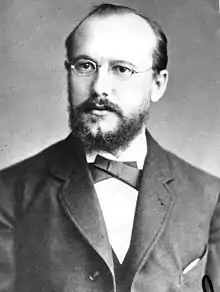Karl Kraepelin
Karl Matthias Friedrich Magnus Kraepelin (/ˈkrɛpəlɪn/; German: [ˈkʁɛːpəliːn]; 14 December 1848 – 28 June 1915)[1] was a German naturalist who specialised in the study of scorpions, centipedes, spiders and solfugids, and was noted for his monograph Scorpiones und Pedipalpi (Berlin) in 1899, which was an exhaustive survey of the taxonomy of the Order Scorpiones.[2] From 1889–1914 he was Director of the Naturhistorisches Museum Hamburg, which was destroyed during World War II, and worked on myriapods from 1901–1916.

Biography
Karl Kraepelin was born in Neustrelitz. He studied natural sciences in Göttingen and Leipzig, and after his PhD in 1873, was professor of mathematics and sciences in Leipzig and Hamburg. In 1884 he became a member of the German Academy of Sciences Leopoldina. He was a member of the Assembly of University Professors of Hamburg from 1901 and the Faculty Council of Colonial Institute from 1908.[3]
He was one of 7 children of scholar, stage actor and singer Karl Kraepelin (1817–1882), who had also founded a theological college.[4] His younger brother, Emil Kraepelin (1856–1926),[5] was a pioneer in experimental psychiatry and Professor of Psychiatry in Munich from 1903–1922. Between 1903 and 1904 Karl, accompanied by Emil, set out on a five-month voyage, visiting Ceylon, India, Singapore and Java, and in 1908 they undertook a two-month trip to the United States.
Kraepelin gained worldwide recognition for his commitment to reform science education in schools. He authored several books on botany and zoology, among which, Leitfaden für den Unterricht an Botanischen mittleren und höheren Schulen ("Guide for botany classes in middle and high schools"). He died in Hamburg, aged 66.
Numerous species were named in his honour, e.g. Boiga kraepelini, the square-headed cat snake,[6][7] Physocypria kraepelini (an ostracod), Clavatula kraepelini (a sea-snail), Tetramorium kraepelini (an ant), Iurus kraepelini (a scorpion) and many others.
Selected publications
- Kraepelin K (1887). "Die Deutschen Süsswasser-Bryozoen. I. Anatomisch-systematischer Teil ". Abhandlungen des Naturwissenschaftlichen Vereins in Hamburg 10: 1-168 + Plates 1-7. Online. (in German)
- Kraepelin K (1900). "Über einige neue Gliederspinnen ". Abhandlungen und Verhandlungen des Naturwissenschaftlichen Vereins in Hamburg 16 (1): 4. (in German).
- Kraepelin K (1901). "Palpigradi und Solifugae. Heft 12 ". pp. xi + 1–159. In: Das Tierreich. Eine Zusammenstellung und Kennzeichnung der rezenten Tierformen. (in German).
- Kraepelin K (1903). "Scorpione und Solifugen Nordost-Afrikas, gesammelt 1900 und 1901 von Carlo Freihern von Erlanger und Oscar Neumann ". Zoologische Jahrbücher. Abteilung für Systematik, Geographie und Biologie der Tiere 18: 557–578. (in German).
- Kraepelin K (1908). "Die sekundären Geschlechtscharaktere der Skorpione, Pedipalpen und Solifugen ". Jahrbuch der Hamburgischen Wissenschaftlichen Anstalten 25: 181–225.[8] (in German).
References
| Wikimedia Commons has media related to Karl Kraepelin. |
- Gordh, Gordon; Headrick, David (2001). A Dictionary of Entomology. Cambridge, Massachusetts: CABI Publishing. 1,031 pp. ISBN 978-0-85199-291-4 (hardback), ISBN 978-0-85199-655-4 (paperback). ("KRAEPELIN, KARL", p. 500).
- Fet, Victor; Sissom, W. David; Lowe, Graeme; Braunwalder, Matt E. (2000). Catalog of the Scorpions of the World (1758–1998). New York: New York Entomological Society. ISBN 0-913-42424-2.
- "Biblioteca Virtual em Saude". Archived from the original on 2010-03-26. Retrieved 2010-08-03.
- Die Psychiatrische Klinik Der Universität München (in German).
- Notable Names Database
- Breuer, Hans; Murphy, William Christopher (2009–2010). "Boiga kraepelini ". Snakes of Taiwan. Retrieved 29 November 2015.CS1 maint: uses authors parameter (link)
- Beolens, Bo; Watkins, Michael; Grayson, Michael (2011). The Eponym Dictionary of Reptiles. Baltimore: Johns Hopkins University Press. xiii + 296 pp. ISBN 978-1-4214-0135-5. ("Kraepelin", p. 146).
- The Arachnid Order Solifugae - Bibliography by Year of Publication
External links
- Newspaper clippings about Karl Kraepelin in the 20th Century Press Archives of the ZBW. (in German).